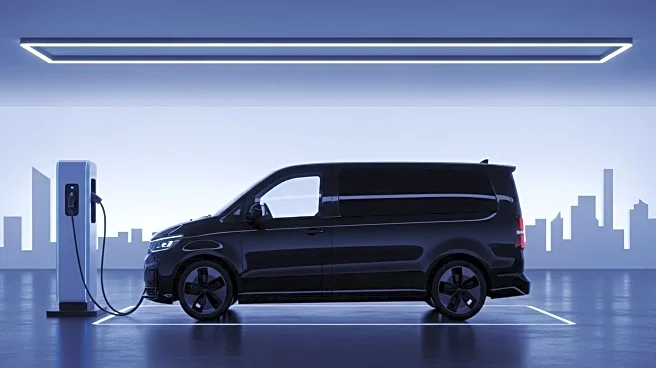What's Happening?
The Arval Mobility Observatory's 2025 Barometer has revealed a decline in fleet expectations for electric van adoption. According to the report, fleets predict that only 14% of their vans will be battery electric by 2028, a decrease from 15% in 2024 and 18% in 2023. Similar trends are observed for plug-in hybrid vans, with expectations dropping from 15% in 2024 to 14% in 2025. Conversely, the expectation for petrol and diesel vans has increased, with fleets predicting 71% of their vans will be traditional fuel vehicles, up from 64% in 2024 and 62% in 2023. John Peters, head of Arval Mobility Observatory in the UK, attributes this decline to operational challenges such as range limitations, payload capacity, and charging infrastructure, which are causing fleets to reconsider their adoption of electric vans.
Why It's Important?
The decline in expectations for electric van adoption is significant as it highlights ongoing challenges in the transition to zero-emission vehicles. This trend could impact the automotive industry's efforts to reduce carbon emissions and meet environmental targets. The reliance on petrol and diesel vehicles suggests that fleets are facing difficulties in integrating electric vans into their operations, which could slow down the overall shift towards sustainable transportation. The findings also indicate that similar issues are being experienced across European and global fleets, suggesting a widespread challenge in the adoption of electric vehicles. Addressing these operational barriers is crucial for achieving broader environmental goals and supporting the growth of the electric vehicle market.
What's Next?
Arval remains optimistic that the adoption of electric and plug-in hybrid vans will increase by the end of the decade, despite current pessimistic predictions. The company is actively working with fleets to find solutions to the operational challenges they face, such as improving charging infrastructure and addressing range and payload limitations. Collaboration among industry stakeholders is essential to overcome these barriers and facilitate the transition to zero-emission vehicles. As fleets continue to evaluate their vehicle strategies, advancements in technology and infrastructure could play a key role in reversing the current trend and encouraging greater adoption of electric vans.
Beyond the Headlines
The decline in electric van adoption expectations raises questions about the readiness of infrastructure and technology to support a widespread transition to zero-emission vehicles. Ethical considerations regarding environmental responsibility and the role of businesses in combating climate change are increasingly relevant. The automotive industry may need to accelerate innovation and investment in sustainable technologies to meet the growing demand for environmentally friendly transportation solutions. Long-term shifts in consumer behavior and regulatory policies could also influence the pace of electric vehicle adoption.










